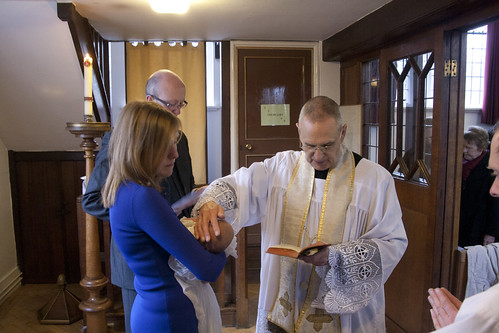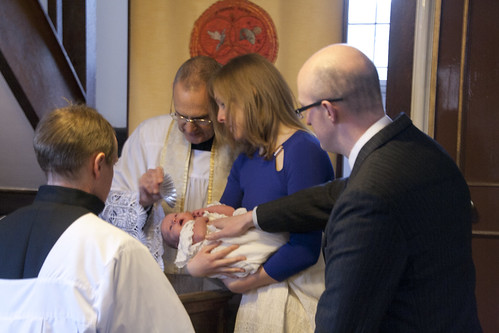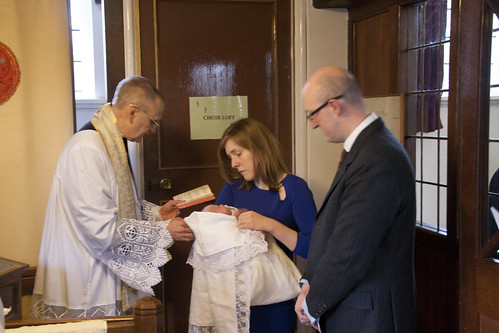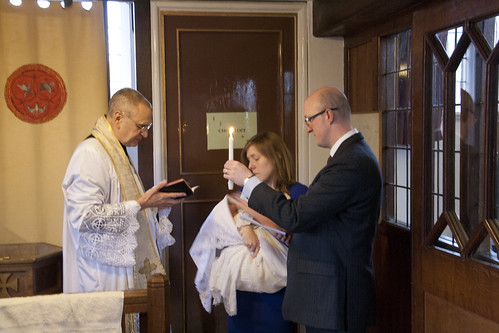 |
| Baptism: anointing with chrism. |
I have been trying to show in my various posts that there is a fundamental difference between Pope Francis, however alarming some may find him, and the liberals embedded however cosily in the Catholic establishment, over the nature of the teaching of the Church. Mgr Basil Loftus has proved to be an excellent foil for the Holy Father in this respect, as an example of the latter. The point, which cannot be emphasised too much, is that the liberals of the Tablet/ Basil Loftus type have lost their sensus Catholicus to the extent that they honestly believe that the teaching of the Church can change. By contrast, Pope Francis' whole approach dealing with the sore points of media perception of the Church is based on the knowledge that it cannot change.
This is not a new thing. Bl Pope John XXIII and Pope Paul VI went to great lengths to present the Church in a more friendly light, to accentuate the positive and attractive aspects of her teaching and mission. They did this knowing that the hard sayings could not, in the end, be denied: the things which the World finds difficult to swallow, the stuff about abortion, contraception, divorce, and sex outside marriage. All we can do is place them in a wider context, not make them the centre of public presentations of the Faith, and that kind of thing. This policy may have been good or it may have been a failure, but it is so far from being a denial of the teachings as to be an acknowledgement of them. They are like enormous rocky islands you have to navigate around.
 |
| The Baptism proper: pouring water. |
The Humanae Vitae dissidents, on the other hand, just wanted to change the teaching on contraception. They saw what the Protestant denominations had done, and couldn't comprehend why the Church couldn't do the same thing. This led to the enormous disappointment they express after each apparent opportunity for change is lost: Vatican II, the theological commission looking into contraception in the 1960s, each new papacy, each synod. Disappointment turns to anger, depression, and misery. The letters pages of the The Tablet under Pope Benedict often looked like the proceedings of some kind of self-help group trying to come to terms with a catastrophe. Right now they are enjoying the brief euphoria which comes with each false hope, but it won't last. Pope Francis will disappoint them, and (unless they can attribute his failure to dark forces or his untimely death), they will turn their anger on him.
 |
| Baptism: giving the white baptismal garment. |
Predictably enough, Loftus is softening us up for radical doctrinal change, in a column I intended to cover earlier but didn't manage, The Catholic Times 1st September 2013. His first example of change is on the fate of the unbaptised.
'On 6th June 1439, as part of the Ecumenical Council of Florence, Pope Eugene IV singed the Papal Bull Laetentur Coeli (let the Heavens Rejoice) which specified that it is "a truth of the Faith to be beleived and accepted, and professed by all", that "the souls of those who die ... only in Original Sin ... go to Hell ... to be punished in various ways.".
 |
| Baptism: giving the lighted candle. |
And this is still the case. Have a look at the Catechism:
1257 The Lord himself affirms that Baptism is necessary for salvation. ... The Church does not know of any means other than Baptism that assures entry into eternal beatitude ...
1261 As regards children who have died without Baptism, the Church can only entrust them to the mercy of God, as she does in her funeral rites for them.
That is all which can be said definitively on the subject. Anything else is just speculation: it cannot be written into the teaching of the Church for the simple reason that it is not included in the Deposit of Faith: it has not been revealed to us. The necessity of Baptism has been revealed: it is in Scripture (eg John 3:5). (Baptism of Blood and Desire are, in a certain sense, ways of being baptised.) And if you think about it it is unavoidable: nothing sinful can go into heaven. The only way we know about for Original Sin to be washed away is Baptism.
Loftus crows that Limbo isn't mentioned in the Catechism, but this means nothing more or less than its not being mentioned by the Council of Florence. In this respect nothing has changed since the 15th Century. Loftus' conclusion about Limbo 'And so it is no more' is just wishful thinking.
Something else Loftus forgot somehow to mention is the Athanasian Creed, one of the three great Creeds of the Church which is still part of her liturgy (it is said in the reformed Office on Trinity Sunday). It begins:
Whosoever will be saved, before all things it is necessary that he hold the catholic faith. Which faith except every one do keep whole and undefiled; without doubt he shall perish everlastingly. And the catholic faith is this: ...
Do all nominal Catholic believe what is asserted by the Athanasian Creed? Well, if they don't, too bad for them. It expresses the Faith of the Church, being without any possible doubt infallible by the Ordinary Magisterium.
 |
| Jesus to Nicodemus: 'Unless you are born of water and the Spirit, you cannot enter the Kingdom of Heaven.' John 3:5 |
The other example of changes to teaching Loftus gives, on the transmission of Original Sin, requires separate treatment.
Do they really dare doubt and question the Creeds?
ReplyDelete"Furthermore it is necessary to everlasting salvation; that he also believe faithfully the Incarnation of our Lord Jesus Christ. For the right Faith is, that we believe and confess: that our Lord Jesus Christ, the Son of God, is God and Man; God, of the Essence of the Father; begotten before the worlds; and Man, of the Essence of his Mother, born in the world. Perfect God, and perfect Man, of a rational soul and human flesh subsisting. Equal to the Father, in respect of his Godhead; and inferior to the Father in respect of his Manhood. Who although he is God and Man is not two, but one Christ. One, not by conversion of the Godhead into flesh: but by assumption of the Manhood by God. One altogether, not by confusion of Essence: but by unity of Person. For as the rational soul and flesh is one man, so God and Man is one Christ".
basil loftus must be a very old priest i believe he was a prof at ushaw in early 50s
ReplyDelete